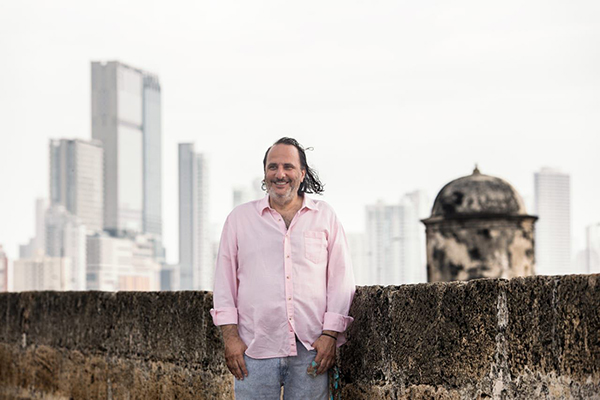| Felipe Aljure (Photo: David Rhenals and Emmanuel Upegui) |
|---|
The Colombian director and arts administrator Felipe Aljure is to become the artistic director of the Cartagena de Indias International Film Festival (FICCI), beginning with its fifty-ninth edition. Aljure steps into a role that has turned the festival into one of the most important in the region, first filled by Monika Wagenberg and later by Diana Bustamante, each artistic directors of the festival for a period of four years.
"The summer solstice brought us Felipe on June 21. His intellectual achievement and experience in many aspects of film have allowed him to conceive a broad and reflexive gaze that will strengthen the festival and continue to raise the bar," said FICCI's general director Lina Rodríguez. "He is a man of exceptional human qualities and great charisma that through his craft has interacted with the festival and the city of Cartagena for decades."

"In Cartagena, the Colombian film scene has had the opportunity to meet with other filmmakers and filmgoers. It has been a space for sharing Colombian film with the world and seeing films from other lands," says Aljure. His relationship with FICCI began when he was at the Film Directorate and supported the festival from the beginning of the Ministry of Culture. "I had been approached in the past as a candidate to be presented to the board, but it was not the right moment for me because of the projects I was developing. On this occasion, I've had the chance to speak with the board and the people who run the festival and we have had opportunity to identify themes of mutual interest. I have found support and freedom to develop these in the fifty-ninth edition of the festival," he remarked.Aljure's experience as a director, producer, and arts administrator allow him to understand the magnitude, relevance, and history of the festival. He is one of the lights of Colombian film in the last three decades. In 1991, he released his debut feature film The People at Universal(La gente de La Universal), which contained aesthetic and narrative innovations that gave it a cult following and that many consider to be the finest film in Colombian history. After directing the television show Mambo (1994), he became the first director of the Film Directorate at the Ministry of Culture and played a key role in formulating the Cinema Law. This experience kept him away from the set for a while, during which time he worked as a consultant and university professor in other cultural fields. He returned to the big screen in 2006 with El Colombian Dream and nine years later with Tres Escapularios (2015), displaying technical, aesthetic, and narrative experimentation in both.
Aljure's experience goes beyond Colombia. He studied Art and Technique of Film Making in London. He got his start in the film world as production assistant on Chronicle of a Death Foretold (1987) by the Italian director Francesco Rosi, assistant camera on The Mission (1986)by the Englishman Roland Joffé, and assistant director on María Cano (1990) by Camila Loboguerrero and Rodrigo D: No Futuro (1990) by Víctor Gaviria. His filmography includes credits as local casting director and director of the second unit of Love in the Time of Cholera (2007) by Mike Newell, production supervisor in Colombia of The Next Three Days(2010) by Paul Haggis, and executive producer of The Lost City of Z (2016) by James Gray.
Regarding his new role as the artistic director of FICCI, he said: "The first thing we will do is preserve the legacy that the festival has built over fifty eight editions, honoring the labors of Victor, Monika, and Diana, who through their work have kept the festival relevant. The festival will always have good films, guests that can contribute, and deep reflections on where Colombian, Caribbean, Latin American, and world cinema find themselves. That heritage must be defended and evolved in the direction of the social, technological, and cultural events that are touching upon the world, so that the festival is always an experience that enriches us as people, regardless of whether we are filmmakers, film fans, or simply filmgoers who love the city of Cartagena."
Lina Rodríguez adds that Aljure's experience will play a key role in FICCI's evolution. "Thanks to his experience at the Film Directorate, his background as producer and director, and his invaluable contribution to film laws and public policies, FICCI will continue to strengthen its bonds with audiences and audiovisual industries in the region. We trust his vision and experience as he steps in to evolve the festival as its artistic director. He will be a great team member as we make important plays to guarantee FICCI's sustainability."
With a new artistic director, the festival will continue being what it is: a party thrown fifty-eight times and counting for the best cinema there is, an authentic and a Caribbean reflection on the state of the industry, an inviting host, but above all, an institution committed to its audiences, alive and eager for transcendence as human beings. We welcome you to our fifty-ninth edition to be held March 6-11, 2019.
